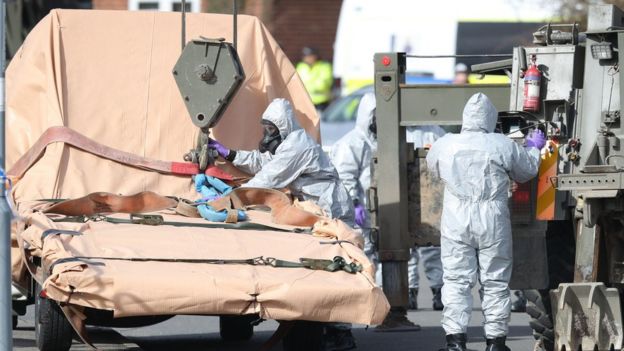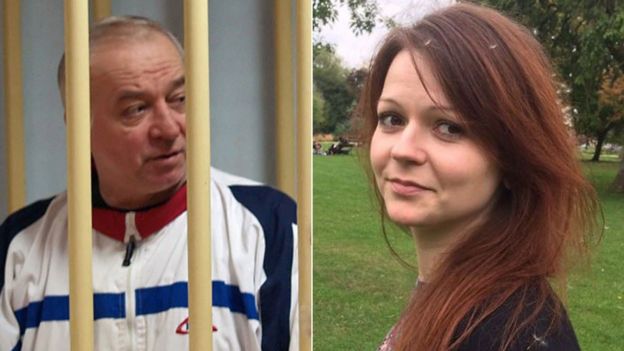The UK will expel 23 Russian diplomats after Moscow refused to explain how a Russian-made nerve agent was used on a former spy in Salisbury, the PM says.
Theresa May said the diplomats, who have a week to leave, were identified as "undeclared intelligence officers".
She also revoked an invitation to Russia's foreign minister, and said the Royal Family would not attend the Fifa World Cup later this year.
Russia denies being involved in the attempted murder of Sergei Skripal.
The Russian Embassy said the expulsion of 23 diplomats was "unacceptable, unjustified and short-sighted".
It is the largest mass expulsion since 31 were ordered out in 1985 after double agent Oleg Gordievsky defected.
Former spy Mr Skripal, 66, and his daughter, Yulia Skripal, 33, remain critically ill in hospital after being found slumped on a bench on 4 March.
Det Sgt Nick Bailey fell ill while responding to the incident, and is in a serious but stable condition, but is thought to be improving.
What we know so far
What are Novichok nerve agents?
Corbyn aide queries proof of Russian guilt
Moscow refused to meet Mrs May's midnight deadline to co-operate in the case, prompting Mrs May to announce a series of measures intended to send a "clear message" to Russia.
They include:
- Expelling 23 diplomats
- Increasing checks on private flights, customs and freight
- Freezing Russian state assets where there is evidence they may be used to threaten the life or property of UK nationals or residents
- Ministers and the Royal Family boycotting the Fifa World Cup in Russia later this year
- Suspending all planned high-level bilateral contacts between the UK and Russia
- Plans to consider new laws to increase defences against "hostile state activity"
Mrs May told MPs that Russia had provided "no explanation" as to how the nerve agent came to be used in the UK, describing Moscow's response as one of "sarcasm, contempt and defiance".
The use of a Russian-made nerve agent on UK soil amounted to the "unlawful use of force", she said.

Soldiers wearing protective clothing prepare to lift and recover a vehicle in Gillingham, Dorset
The PM, who was earlier briefed by senior intelligence chiefs in Downing Street, added there was "no alternative conclusion other than that the Russian state was culpable" for the attack.
She said it was "tragic" that Russian President Vladimir Putin had "chosen to act in this way".
Labour leader Jeremy Corbyn was jeered by Conservative MPs as he asked Mrs May how she had responded to Russia's request for a sample of the nerve agent so it could run its own tests.
He condemned the Salisbury incident as a "dreadful, appalling act" and called for multilateral action in response, saying it was a matter of "huge regret" that the UK's diplomatic network had been cut by 25% in the last five years.
The Foreign Office has updated its advice on travel to Russia, saying "heightened political tensions" mean Britons should "be aware of the possibility of anti-British sentiment or harassment at this time".
In a statement, the FA said it would work closely with the UK government and authorities regarding its participation in the World Cup in June.
The spy at centre of poison mystery
Russia retaliation could hurt UK business
Meanwhile, the police and army have sealed off areas of the north Dorset town of Gillingham as part of the attempted murder investigation.
A wide cordon is in place around a truck, thought to have recovered Mr Skripal's car from Salisbury, about 20 miles from Gillingham.
About 180 troops have been deployed to Salisbury to help remove vehicles and objects from affected areas.
Zizzi restaurant and Bishop's Mill pub, where the Skripals visited before falling ill, remain closed.
Police from 15 forces across England and Wales have been sent to Wiltshire to support the investigation.

Sergei Skripal, 66, and his daughter Yulia, 33, are in a critical condition in hospital
Russia's foreign ministry said Mrs May's statement was "an unprecedentedly crude provocation".
It said it was "categorically unacceptable and unworthy" that the UK government had "seriously aggravated" relations by announcing a "whole set of hostile measures".
Earlier, Russian foreign minister Sergei Lavrov said Moscow would co-operate if it received a formal request for clarification from the UK under the Chemical Weapons Convention, which sets a 10-day time limit for a response.
Speaking ahead of the PM's statement, a spokesman for Mr Putin said: "Moscow won't accept absolutely unfounded accusations against it, which are not substantiated by any evidence, and won't accept the language of ultimatum."
Chemical weapons expert Hamish de Bretton Gordon has told the BBC he believes the nerve agent was produced in Shikhany in central Russia - their equivalent to Britain's military research base, Porton Down.
He told the BBC it was a secure location and if the Russians were serious about cooperating in any investigation, they should give the Organisation for the Prohibition of Chemical Weapons (OPCW) access to the site.
The UK is to brief the UN Security Council on the investigation at 19:00 GMT, and earlier met Nato's North Atlantic Council.
At the meeting, Nato allies expressed "deep concern" at the use of a nerve agent and said it was a "clear breach of international norms and agreements".
Mrs May has welcomed support from allies including the US, Nato and the EU, and said Britain would be pushing for a "robust international response" at the UN Security Council later.
"This was not just an act of attempted murder in Salisbury - nor just an act against UK," she said.
"It is an affront to the prohibition on the use of chemical weapons."
Mr Skripal, a British citizen, came to the UK in 2010 as part of a "spy swap" after he had been convicted by Russia of passing information to MI6.

No comments:
Post a Comment